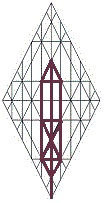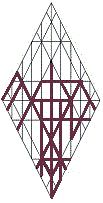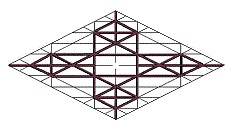 |
myyjh xo סץ החיים Tree of Lives |
 |
|||||||||
|
All of us share the Breath of Life, and none of us possesses it.
It's a simple concept, and utterly true. There's no argument
against it! And yet, there are—oh!—so many of us, it seems, who
do not understand what this simple truth means for each of us. We share
one Breath, and it makes no sense whatsoever that we should war
against each other to gain advantage, one over the other; for to
war against another for any reason at all is to war against
oneself, against God:
against the Breath that sustains every living soul.
Generally speaking, those
who devote their lives to spiritual pursuits agree that the road to peace,
which empties onto the grounds of the Tree of Life, is paved by self-denial.
Among students of Truth, many consider self-denial to be
a discipline limited to fasts against physical
comforts, such as curtailing appetite by eating only one helping
at dinner, wearing the same coat until it's threadbare, and so
forth.
I'll not argue against such sacrifice, nor even
against the more worthy fast of preferring the welfare of another
above one's own; but the
virtue of self-denial is deeper than any of this: it's visceral.
Self-denial imposes itself on every understanding by which a
person might define
himself. Beyond self in every way, self-denial is rooted in our relationship with the
Life Breath that hides between the inhale and exhale of our own
breathing. It might have written, ".
. . exhale of our own breath." But that's the point: our breath
is not our own.
We are to honor
hwhy
with every breath we
take, in accordance with the admonition, "You shall have no
other gods before me." As creatures, we have control over the
inhale and the exhale of breathing, but not over the Father's
Holy Breath, upon which breathing feeds. Could we monitor our
utilization of Breath as we breathe (approaching
congruence with the first of the ten sayings), we would made
great progress in denial of self. Deeper yet, could we lose
thought of ourselves, altogether, by resting upon
Together as One, our bodies comprise the temple of the Breath. Because that concept is reality and not empty words, it behooves us to be mindful of the Breath's Presence within and among us all as we breathe. We ought to pay attention; for to walk in the Holy Spirit is to maintain awareness of the Presence that hides within the Breath we share. To walk as servants in the Father's Breath is to become as One with that Breath, allowing us to serve all as faces of One, denying the very concept of self.
To be mindful of God's Presence within us as we live, move, and
have being establishes a kind of triangulation between heart,
mind, and the works they engender. This yoga sanctifies
relationships and clarifies the distinction between who we truly are and what we
apparently do.
Although we are children of God, we sometimes fall short and misbehave; but
at times, what seems as error is behavior that's
beyond our control, as though taken out of our hands, like the denials of Peter after
Gethsemane. Such questions cannot be answered if self stands in
judgment of self. Triangulation
opens our minds to instruction, and the Small Voice of the Breath calls to us
from within the quiet of our open hearts.
As we are enabled to hear and answer that call, the chakras—the
sephiroth, the buds of the menorah—open unto the fullness of
Father’s love and, most significantly, unto the particulars of
his counsel, as conveyed within the whispers of the Small Voice
in the manner of messages to the
Churches of Asia.
Living in dedication to the Breath, we are
transformed and shall be transfigured; for beyond the celestial
body, the astral body of the East, it does not yet appear
what we shall be. We understand that allegiance to the Breath is the
Way, the Truth, and the Life; and so, we follow in
Y'shua's steps,
taking up our staves—our
crosses, determined that we shall follow,
insofar as we shall be enabled.
The sap of the Tree of Lives sustaining us, we drink of Eden's
rivers to slake our thirst by giving shape to our
thoughts; and we draw strength from the Holy Breath as we climb
the hillside path that crosses the needs of Earth and the
concerns of Heaven. Children of the Breath, we drink Living
Waters to our fill; for the Father's pleasure is that we have
Life; and that, in abundance.
Should we seem to lack anything, the fault
will most likely be because of error—not "sin," particularly,
but error; for our errors withhold good things from us.
Our frail helplessness is well known—on Earth, as it is in
Heaven! How, then, shall we be weaned from the erroneous counsel
of the ungodly, who put such things as commerce, knowledge—any earthly thing, really—above the common-sense realization
that we are here for one purpose: to celebrate the Breath of
Life?!
If our faith is weak, the arguments of the
world are strong; and it's not in our power to strengthen our
own faith; for that is the Father's business. Our only remedy is
to reaffirm the gesture by which we first began: we rededicate
ourselves in living sacrifice to the Breath that sustains us.
Re-gathering our thoughts in this manner, we ensure that we share
the Breath in dedication to HaShem. In the Kingdom of Names, coworkers with the Father are provided a place at his table. It behooves us, therefore, to utilize God’s Breath on behalf of the Kingdom the Father is building in our hearts, as a collective and as individuals. With the Presence foremost in our thoughts, God’s Spirit will address even those questions we cannot yet verbalize, and the substance of our dialog with God's Breath, will increase faith and clarify the way forward.
Self-denial
does include careful confession
and
reformed behaviors. Those virtues are important; but to yield
lasting fruit in our lives and in the lives of those with whom
we interact, self-denial must find its root in the Breath: for
it is there—just beyond perception—that we must
face
our measurements in the mind of God. To value ourselves is
unavoidable, but self-denial is essentially the invaluable matter of
recognizing God’s primacy in our lives.
Attaining the vacuum at the Hill of the Skull, self-denial is the
gasp of silence in our souls that compels us to accept that the
throne of Heaven
is mirrored in our hearts, upon which the King sits, measuring our passion. Because
we recognize the Presence, our souls take flight as the inward gates
of Heaven are lifted up and the King of Glory rises from his throne
to greet us in the air, Face upon face.
It is God's pleasure to join with us; for
owcwhy,
the Shout of
hy,
has been knocking patiently at the doors of our hearts over many
lifetimes, whispering our names as they unfold, ensuring that we will be alert on
the day the Father has appointed that we should answer his call.
Recognition of incorruptible divinity hidden within the core of
the outer husk is the key; but
if the burden of recognition were ours—as though it is our
responsibility to focus inward eyes, bringing Messiah into
focus—the path to self-denial would become very difficult.
Personal capabilities would then be the way and the truth in our
lives; and skill, not faith, would provide pathways to
the Presence. The self we are instructed to deny would then be
in control of the machinery of recognition and, thus, of the
machinery of salvation, making self-denial all but impossible.
Recognition is crucial; for the simple ability to recognize a
thing is the gift of God, even as a good wife is the gift of
God.
At is core, intelligence is successful utilization
of recognition; and, again, the ability to recognize, like the
ability to recall familiar concepts when they're useful, is the
gift of God. That the mind is able to recognize, collate, and
conclude is argument that mental processes reflect the handwork
of a Creator. We think as we do because of our design, and the
efficacy of our thought processes answers to the Creator's good
pleasure concerning that design's functionality at any given
moment.
Our words and actions utilize the Breath and are therefore
subject to the Breath. In our spiritual lives, as in our
natural lives, we cannot even conceive of a thing to be said or
done, except God brings it to mind. The Teacher of
Righteousness, Y'shua confessed that he, by himself, could do
nothing, and that the words he spoke were uttered as he
heard
them: he didn't speak what he heard, but
as he
heard.
Along with brother Y'shua, who was well acquainted with grief,
we breathe the same Breath and are subject to the same thought
patterns, which argues that we all are the Children of One. The
smiles on our faces, the glints in our eyes or the downturns at
the corners of our mouths—all these argue that every
one
of us shares the same Life at a very basic level. Such
affirmations of commonality must, in their fullest extension,
lead to efficacious thinking; for righteous thought is
celebration of the Brotherhood of Man within the unifying
context of the Father's Life, which we measure as we breathe.
The Tree of Life can be sensed as a column of holy Breath in
alignment with the human spine. The Tree provides a covering
o
for mortals
x,
so our days
h
of laboring together to reach agreement between Heaven and
Earth
j
can be blessed by the benefit
y
of shared
y
counsel
m.
The canopy of the Life Tree is a patchwork of understandings
o
that knits
x
God’s Light
h
into garments
j
that satisfy
y
the needs
y
of everyone
m.
Wheels within wheels. The apostles turned the world upside down,
teaching that the roots of mortal man are in Heaven, not on
Earth—that our lives on Earth resemble a spiral, the line of
experience transecting the circle of incarnation, moving through
and beyond. It should come as no surprise, therefore, that the
boundaries of East and West must blur at the end of this present
age.
There is no inadequacy of the heart or mind that
HaShem
hwhy
cannot turn to the glory of his Holy Name; for in this temporal
land
o
of transformations
x,
each of us is called to examine
h
the relationship
j
between our willful deeds
y
and the beneficial will of the Engineer
y
of our Destiny
m.
Gematria
233
glr:
Numerology
80
p
>
8
j;
Targum:
|
|||||||||||
|
|||||||||||
 and
within the Breath, settling into Zen, at rest before the open door
the apostle characterized as “prayer without ceasing,”
and
within the Breath, settling into Zen, at rest before the open door
the apostle characterized as “prayer without ceasing,” 
 Tempted
in the desert by such things as are common to Man, Y’shua overcame
by self denial, not by accomplishment; and in his ministry, he
walked among men as though he were a hole in the air: a perfect
cipher, in which and through which his friends could perceive the
fullness of the Father. He had faith to appear before the
multitudes, again and again, without giving thought to what he would
say or do; for his soul was surrendered in sacrifice to the Father's
will.
Tempted
in the desert by such things as are common to Man, Y’shua overcame
by self denial, not by accomplishment; and in his ministry, he
walked among men as though he were a hole in the air: a perfect
cipher, in which and through which his friends could perceive the
fullness of the Father. He had faith to appear before the
multitudes, again and again, without giving thought to what he would
say or do; for his soul was surrendered in sacrifice to the Father's
will.